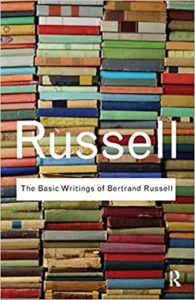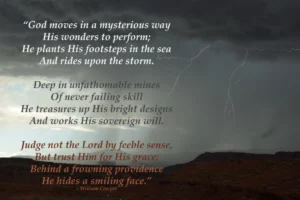
Bertrand Russell: Unyielding Grimace Against a Pointless Universe
Such, in outline, but even more purposeless, more void of meaning, is the world which Science presents for our belief. Amid such a world, if anywhere, our ideals henceforward must find a home. That Man is the product of causes which had no provision of the end they were achieving; that his origin, his growth, his hopes and fears, his loves and his beliefs, are but the outcome of accidental collocations of atoms; that no fire, no heroism, no intensity of thought and feeling, can preserve an individual life beyond the grave; that all the labours of the ages, all the devotion, all the inspiration, all the noonday brightness of human genius, are destined to extinction in the vast death of the solar system, and that the whole temple of Man’s achievement must inevitably be buried beneath the debris of a universe in ruins—all these things, if not quite beyond dispute, are yet so nearly certain that no philosophy which rejects them can hope to stand. Only within the scaffolding of these truths, only on the firm foundation of unyielding despair, can the soul’s habitation henceforth be safely built (p. 39).
Brief and powerless is Man’s life; on him and all his race the slow sure doom falls pitiless and dark. Blind to good and evil, reckless of destruction, omnipotent matter rolls on its relentless way; for Man, condemned today to lose his dearest, tomorrow himself to pass through the gate of darkness, it remains only to cherish, ere yet the blow falls, the lofty thoughts that ennoble his little day; disdaining the coward terrors of the slave of Fate, to worship at the shrine that his own hands have built; undismayed by the empire of chance, to preserve a mind free from the wanton tyranny that rules his outward life; proudly defiant of the irresistible forces that tolerate, for a moment, his knowledge and his condemnation, to sustain alone, a weary but unyielding Atlas, the world that his own ideals have fashioned despite the trampling march of unconscious power (p. 44).
Source: Bertrand Russell, “A Free Man’s Worship” in The Basic Writings of Bertrand Russell, ed. Robert Egner and Lester Denonn (Routledge Classics, 2009), pp. 38-44.
———————————–
John Calvin: Calm Repose Under God’s Smiling Providence
Psalm 107: 42-43
41. [God] raises up the needy out of affliction
and makes their families like flocks.
42. The upright see it and are glad,
and all wickedness shuts its mouth.
43. Whoever is wise, let him attend to these things;
let them consider the steadfast love of the Lord.
John Calvin’s comment.
42. The righteous shall see that, and shall rejoice. The prophet now draws the conclusion, that so many evident tokens of God’s superintending and overruling providence could not transpire before the righteous without attracting their notice, and that their vision being illuminated by faith, these scenes are contemplated by them with unfeigned delight; while the wicked remain perplexed and mute. For he very judiciously makes a distinction between these two classes of persons. In whatever manner the wicked may be constrained to recognize God as the supreme ruler of the universe, nevertheless, in seeing they see not, and derive nothing from the sight, except that their conduct is rendered the more inexcusable. But the righteous are not only able to form a good and sound judgment of these events, they also spontaneously open their eyes to contemplate the equity, goodness, and wisdom of God, the sight and knowledge of which are refreshing to them. For the joy which they experience in this exercise is a pledge that their thus observing these things was the spontaneous effusion of their hearts…And we will never be able to arrive at a calm state of mind until we are taught to repose with implicit confidence in the providence of God.
43. Whosoever is wise, so as to observe these things. We are now informed that men begin to be wise when they turn their whole attention to the contemplation of the works of God, and that all others besides are fools. For however much they may pique themselves upon their superior acuteness and subtilty, all this is of no avail so long as they shut their eyes against the light which is presented to them. In employing this interrogatory form of address, he indirectly adverts to that false persuasion which prevails in the world, at the very time when the most daring heaven-despiser esteems himself to be the wisest of men; as if he should say, that all those who do not properly observe the providence of God, will be found to be nothing but fools. This caution is the more necessary, since we find that some of the greatest of philosophers were so mischievous as to devote their talents to obscure and conceal the providence of God, and, entirely overlooking his agency, ascribed all to secondary causes…By the term, observe, he informs us, that the bare apprehension of the works of God is not enough,—they must be carefully considered in order that the knowledge of them may be deliberately and maturely digested. And, therefore, that it may be engraven upon our hearts, we must make these works the theme of our attentive and constant meditation…his loving-kindness shines most conspicuously, and occupies a very prominent place in all that he does; for he is naturally prone to loving-kindness, by which also he draws us to himself.
Source. Calvin’s Commentary on the Book of Psalms

——————
Rom. 8:28. And we know that for those who love God all things work together for good, for those who are called according to his purpose.
2 Cor. 4:16-18 So we do not lose heart. Though our outer self is wasting away, our inner self is being renewed day by day. For this light momentary affliction is preparing for us an eternal weight of glory beyond all comparison, as we look not to the things that are seen but to the things that are unseen. For the things that are seen are transient, but the things that are unseen are eternal.
Related Post
Bertrand Russell: The Spirit of Solitude 1872-1921. Book Review
Dear Dr. Kam Weng, Shalom:
Praise GOD and TQVM for your continued out-pouring of intellectual/apologetic gems, all of which are sublime/ profound, treasured and kept for ready reference. May the LORD raise many more Christlike disciples like you from Malaysia and beyond to triumph in the intellectual/ apologetic arena for His glory and the sake of the Gospel, as He has also raised great apologists like David Wood, Sam Shamoun, Christian Prince, Jay Smith, al-Fadi and others in trumping Islamist polemicists (readers may view lots of such scenes through YouTubes). Amen amen!!
Thanks KS for your encouraging words. I would hesitate to compare myself with the more well-known apologists. I am only trying to be a faithful witness, tending the small ‘garden patch’ which God has assigned to me. Nevertheless, I share the same prayer with you that God will raise up many Christians in Malaysia who are passionate to think God’s thoughts after him and to witness with boldness not because they are confident in themselves, but because they have been entrusted with the all surpassing truth of God which brings healing and salvation to all who believe in Jesus Christ.